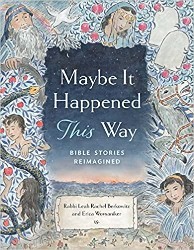By
– May 28, 2013
Once again Jon Levenson has published a scholarly work that gives depth to a contemporary religious concern where it is all too easy to fall into simple answers. Inheriting Abraham takes on an idea at the foundation of interfaith dialogue: that in Abraham, the three monotheistic faiths have a shared point of departure that can be the basis for understanding.
Levenson gives a detailed, nuanced reading of the Abraham narrative. Along the way are some insights counter to what we usually hear. Levenson argues that the story of Akedat Yitzchak (the binding of Isaac) presumes that child sacrifice was a legitimate demand that God made of Abraham.
At the same time, Levenson comments on how episodes in the Abraham story are viewed in the Talmudic tradition, early Christianity, and Islam. Nowhere in the Torah is Abraham taken to be the specific founder of Judaism. The view that Abraham was the first seeker, philosopher, or mystic — oft en taken as the basis for interfaith understanding — originates in the early Christi an centuries, long after the biblical text. Levenson discusses two issues that Paul delves into in his epistles: whether there can be covenant without circumcision, and whether Abraham is a model of “justification by faith.”
Levenson’s purpose is to sound a note of caution regarding interfaith dialogue around Abraham. Levenson argues that Judaism, Christianity, and Islam view Abraham in distinct ways that reflect the overall differences among the faiths. A religious person is unlikely to give up his or her distinctive Abraham, in favor of the putative original, “pre-traditional” Abraham of the Bible. Anyone willing to put such an Abraham at the center would not truly be representing her own tradition.
Though Levenson might not have set out to do this, his work presents an opportunity for interfaith conversation around the interpretive differences. People from different groups could study Abraham with Levenson as a guide, and explain to one another the Abraham each one sees. The common text would not create a common truth, but a common agenda, and a helpful way for adherents of each faith to get a clearer understanding of the faith of others. Abbreviations, biblography, notes.
Jonathan Spira-Savett is a rabbi and teen educator. He is the rabbi at Temple Beth Abraham in Nashua, NH. His work focuses on civic education and youth philanthropy, and he has taught history, literature, and environmental studies in addition to traditional Jewish texts.





